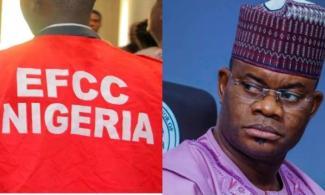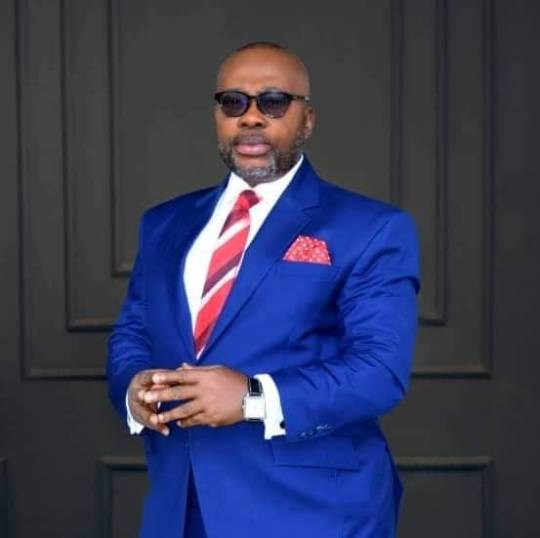#Economic and Financial Crimes Commission (EFCC
Explore tagged Tumblr posts
Text
EFCC Detains 10 Officers For Alleged Theft of Missing Items
EFCC Detains 10 Officers For Alleged Theft of Missing Items In its continuing efforts to sweep the Economic and Financial Crimes Commission, EFCC, clean of corrupt tendencies, 10 officers of the Lagos Zonal Command of the Economic and Financial Crimes Commission, EFCC, are being detained over investigation of some missing items involving them. The officers, who were arrested last week on the…
0 notes
Photo



(via ANTI GRAFT WAR: How The IGP Ordered The Immediate Withdrawal Of 11 Policemen Attached To Yahaya Bello.)
0 notes
Text
Dangote Speaks On EFCC’s Visit To Its Headquarters
Management of Dangote Industries Limited has doused the concerns of stakeholders following the visit to its Head office in Lagos by officials of the Economic and Financial Crimes Commission (EFCC) saying it was ready to assist the Commission in its investigations. The foremost indigenous conglomerate in a statement disclosed that it received a letter from the EFCC on December 6, 2023, requesting…
View On WordPress
0 notes
Text

https://www.reuters.com/world/middle-east/syrian-mass-graves-expose-machinery-death-under-assad-top-prosecutor-says-2024-12-17/
30 notes
·
View notes
Text
EFCC declares Leno Adesanya, promoter of Sunrise Power, wanted
ABUJA – Leno Adesanya has been declared wanted by the Economic and Financial Crimes Commission (EFCC).
Adesanya is the promoter of Sunrise Power and Transmission Ltd.
In a notice issued on Tuesday, the EFCC said Adesanya is wanted “in an alleged case of conspiracy and corrupt offer to public officers”.
Adesanwa was mentioned in three out of the seven-count charges preferred against Olu Agunloye, former minister of power and steel.
The EFCC is prosecuting Agunloye over the $6 billion Mambilla hydropower contract.
Reported that EFCC traced some suspicious payments made by Sunrise Power and Transmission Ltd to Agunloye’s bank accounts.
In one of the counts, the EFCC alleged that on August 10, 2019, Agunloye “corruptly received the sum of N3,600,000.00” through his Guaranty Trust Bank account no.0022530926 from Sunrise Power and Transmission Company Limited (SPTCL) and Leno Adesanya for approving the Mambilla Hydroelectric Power Station project.
Former President Olusegun Obasanjo had challenged Agunloye to tell Nigerians where he derived the authority to award a $6 billion contract to Sunrise for the Mambilla hydropower project in 2003.
Sunrise Power is in arbitration with Nigeria at the International Chamber of Commerce (ICC), Paris, France, alleging a breach of contract.
The company said it was awarded a $6 billion build, operate and transfer (BOT) contract in May 2003 by the Obasanjo administration but that the federal government repudiated the agreement.
Sunrise is asking for a compensation of $2.3 billion, claiming it had spent millions of dollars on financial and legal consultants before the contract was jettisoned.
In its defence at the arbitration, the Nigerian government is alleging fraud and corruption of public officials in the award of the contract.
The matter is similar to the P&ID case in which a UK court nullified an $11 billion award against the country for the same reasons.
2 notes
·
View notes
Text
EFCC debunks 2023 recruitment rumour online

The Economic and Financial Crimes Commission, EFCC, has denied reports that it is currently recruiting. The anti-graft agency in a tweet on Monday urged the public to disregard information circulating on social media An online report had claimed that the commission commenced 2023 recruitment on July 4th, 2023. But the security agency warned prospective applicants that the information is false and misleading. In a statement, it said, ”The information, which is obviously the handiwork of fraudsters, advises prospective applicants to click a link (https//spukd.com/EFCC-2023-Recruitment-Portal).” The Commission warned the public against clicking any link that cannot be found on its website (http://efcc.gov.ng). ”We also use this opportunity to urge members of the public to cross-check any EFCC employment information in the social media with the Commission by email to : [email protected] or call 08093322644.” it added Read the full article
2 notes
·
View notes
Text
EFCC raids NAHCON headquarters in Abuja over N90bn hajj fund misappropiation
EFCC raids NAHCON headquarters in Abuja over N90bn hajj fund misappropiation Operatives of the Economic and Financial Crimes Commission, EFCC, on Tuesday, February 5, raided the National Hajj Commission of Nigeria, NAHCON, headquarters in Abuja over allegations of fraud and fund misappropriation. During the operation, NAHCON’s spokesperson, Fatimah Usara, along with three other unidentified staff…
0 notes
Text
Court Clears Fani-Kayode Of EFCC’s Medical Report Forgery Case
An Ikeja Special Offences Court on Tuesday discharged and acquitted a former Minister of Aviation, Femi Fani-Kayode, of a medical report forgery charge. The Economic and Financial Crimes Commission on November 11, 2021, charged Mr Fani-Kayode with 12 counts, including procuring of documents by false pretences, using false documents, fabricating evidence, and using fabricated evidence. He pleaded…
0 notes
Text
EFCC Dismisses 27 Officers for Fraudulent Activities, Misconduct
EFCC Dismisses 27 Officers for Fraudulent Activities, Misconduct In its quest to enforce integrity and rid its fold of fraudulent elements, the Economic and Financial Crimes Commission, EFCC, dismissed twenty seven (27) officers from its workforce in 2024. The officers were dismissed for various offences bordering on fraudulent activities and misconduct. Their dismissal, FOLLOWING THE…
0 notes
Text
Nigerians Defend Corrupt Leaders Yet Complain About Corruption – Olukoyede
The Chairman of the Economic and Financial Crimes Commission (EFCC), Ola Olukoyede, says Nigerians condemn corruption yet rally behind corrupt leaders when they are being prosecuted. Olukoyede said underdevelopment would be a thing of the past if every citizen sees corruption as a common enemy. “Everybody is crying that Nigerians are corrupt, that the system is corrupt; that corruption is…
0 notes
Text
EFCC and bidders clash over car auction process
The Economic and Financial Crimes Commission (EFCC) has responded to bidders protesting alleged irregularities in the recent car auction held across various locations in the country. The auction, which took place between Monday, January 20, and Monday, January 27, 2025, concluded with bidders sharing screenshots on social media showing exorbitant bid amounts, prompting many to withdraw from the…
0 notes
Text
EFCC Arrests Former NHIS Boss, Usman Yusuf in Abuja Raid
Operatives of the Economic and Financial Crimes Commission (EFCC) have raided the Abuja home of a former Executive Secretary of the National Health Insurance Scheme (NHIS), Prof. Usman Yusuf, picking him up. It was learnt that the gun-wielding operatives arrested the professor of haematology-oncology and bone marrow transplantation in his house in the presence of his wife and children at about…
0 notes
Text
Analysis of Barrister Monday Ubani's Insights on the Appointment of the EFCC Chairman.
In a recent interview, Barrister Monday Onyekachi Ubani, Special Adviser to the Serving Senate President, provided a comprehensive analysis of the appointment of Mr. Ola Olukoyode as the chairman of the Economic and Financial Crimes Commission (EFCC) in Nigeria. With an emphasis on legal considerations, ethical challenges, and the expectations for the EFCC’s future operations, Barrister Ubani…

View On WordPress
#Anti-Corruption#EFCC (Economic and Financial Crimes Commission)#Ethics in Governance#Governance#Impartiality#Legal Perspective#NIGERIA#Political Landscape#RULE OF LAW#Transparency
0 notes
Text
EFCC Reaffirms Stand Against Cyberbullying, Online Harassment in Nigeria As NANS Launches Cyber Security Awareness
The Economic and Financial Crimes Commission (EFCC) has reaffirmed its commitment to combating cyberbullying and online harassment in Nigeria. Mr. Ola Olukoyede, Executive Chairman of the EFCC, represented by Assistant Superintendent Philip Ogunjobi, emphasized the need for collective action against online abuse during a paper presentation at the National Association of Nigeria Students (NANS)…
0 notes
Text
EFCC Names Academy Building after Slain Officer
As a gesture of immortalizing a slain officer of the Economic and Financial Crimes Commission, EFCC, Assistant Superintendent of the EFCC, ASE 1 Aminu Sahabi Salisu, the Commission has named the administrative block of its Academy in Karu, Abuja after him. Executive Chairman of the EFCC, Mr. Ola Olukoyede disclosed this in Abuja on Saturday, January 25, 2025 while addressing staff of the…
0 notes
Text
An EFCC officer was killed in Anambra shootout with Yahoo boys
Tragedy struck Anambra, Nigeria, when an official of the Economic and Financial Crimes Commission (EFCC) was slain in an attack by suspected internet fraudsters known as Yahoo Boys. The terrorists ambushed the officers during an operation, killing one and injuring another before fleeing. According to witnesses, the operatives were pursuing the suspects for alleged involvement in fraudulent…
0 notes